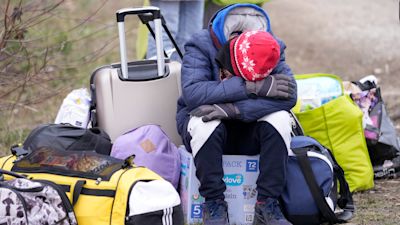Insight
Is the UK as 'generous' as Boris Johnson claims it is with regards to refugees?

The government has been criticised for not going as far as the EU in opening our doors to Ukrainian refugees.
While Ireland dropped all visa requirements for those fleeing the war, we reduced them (security checks will remain) only for the immediate family members of those already settled in Britain. There is, of course, the suggestion this group could expand, but it is unlikely to become a universal offer.
Boris Johnson, however, has insisted that we are incredibly generous when it comes to refugees.
Speaking at a Ukrainian Catholic Cathedral in central London on Sunday, he said he wanted to knock “some fake news” on the head, saying: “The UK is well out in front in our willingness to help with refugees.”
But is that true?
According to the Migration Observatory at the University of Oxford – not really.
They say that if you compare the 10 European countries who have taken most refugees since 2015, the UK is ahead on something known as “resettlement” – which consists of specific UN programmes that hand-pick refugees and move them to another country.
So they can argue that in resettling refugees, they do a good job.
But that accounts for less than 6 percent of the total numbers who have fled their countries to get to Europe since 2015.
Academics from the Migration Observatory shared their analysis of the full picture exclusively with ITV’s Peston – giving us a sneak preview of a new report they have coming out.
It shows that some 92,000 refugees have come to Britain since 2015 – a number that does place us in the top 10 for Europe.
But in seventh place we are below Austria, Spain, Italy, Sweden, France and way behind Germany – whose 1.1 million was too big a number to fit on the scale.
Dr Peter William Walsh, Senior Researcher at the Migration Observatory, said the statistics showed clearly: "The UK doesn’t offer protection to as many people as other European countries, especially when relative to its population.”
He said that under per capita figures, Britain falls to 20th on the list, offering protection to 1.4 per 1,000 of its resident population of 67 million – while Sweden gives sanctuary to 16 per 1,000 of its 10 million population.
“Deciding what numbers of people the UK should be protecting is not a technocratic process that can be done by some sort of algorithm. It is fundamentally political and depends on the willingness of government to offer support. Questions of 'capacity' are extremely subjective,” he said.
Those in the charity sector working in this field would argue that the government is not being generous, but instead pursuing an increasingly hardline approach when it comes to refugees.
They believe that the political desire to tackle the numbers of people boarding dangerous boats and trying to make the journey across the Channel (which several Red Wall MPs have raised with me as a top issue for their constituents), has led to an excessively tough new policy.
The Nationality and Borders bill, which is currently making its way through the House of Lords, will effectively criminalise any asylum seeker who arrives into the UK illegally. That covers anyone arriving without prior permission, including those piling into boats in France.
Under the new rules, those asylum seekers could face being sent to off-shore processing centres.
Bella Sankey, director of Detention Action, called the legislation “inhumane”, arguing it would criminalise Ukrainians coming to Britain that way.
Campaigners point out that the government’s own equality impact assessment of the borders’ bill admits there is limited evidence to back up the idea that being tough will deter people trying to enter the UK, and even warns it could push people into even riskier attempts to cross the Channel.
But ministers are convinced this is the best way to stop people placing their lives in the hands of smugglers as they try to get to Britain.
They – and their MPs – believe that the sight of boats arriving in Dover has led the public to lose confidence in the government on the question of immigration (with some opinion polls placing Labour ahead on this issue).
And they think that could hurt them electorally. In fact, if you look at Yougov polling from last week – it shows that while half the public overall thought then we have a “moral duty” to help Ukrainian refugees – above the 32 percent who do not – among Tory voters the reverse was true.
But moral duty or not, by this week – after a weekend of haunting images from Ukraine – one polling stat is clear, whichever political party people support.
An overwhelming majority – 77 percent to 12 percent – believe that visa requirements should be dropped for Ukrainians right now, whether they have links to Britain or not.
This is the kind of data that is pressuring the government to move further – from telling us about immediate family members being welcomed on Sunday, to claiming that up to 100,000 could come under that policy on Monday, to suggesting it could be up to 200,000 today.
For all the debate on this issue many Ukrainians tell me that this is not the issue at the forefront of their forefront of their minds. Even those in Britain say that most of their relatives want to remain close to home, if not within Ukraine itself, taking up arms.
And civil society groups – who came together to publish the so-called Kyiv Declaration were focused on safe areas under potential no fly zones and a ramping up of sanctions.
Listen to the ITV News podcast What You Need To Know, for the latest expert analysis on Ukraine